The Republican Party has worked to cull Trump’s signature populism — and it just might cost them 2020
Last month, over a hundred major Republican donors descended upon Trump International Hotel to meet with campaign advisors and devise a strategy for the 2020 presidential election. Most left dissatisfied and unconfident that President Trump’s team had developed a coherent re-election strategy.
What they don’t realize is that President Trump envisioned and produced a winning strategy in 2016 — but now the same wealthy donors and political elites that claim to support him are working to sabotage it.
Looking at Trump’s actual policy maneuvers over the last two years, it’s hard to argue that any of them wouldn’t have been implemented under a more mainstream Republican administration. Sure, there were comical outbursts and antagonistic tweets, but the product has been vastly different from the messaging. Cutting corporate taxes, rolling back financial and environmental regulations, ending the Affordable Care Act’s individual mandate, appointing conservative Supreme Court justices, recognizing Jerusalem as the capital of Israel and withdrawing from the Iran deal — all maneuvers universally supported by the GOP. Even the notorious Trump foil Mitt Romney admitted that the president’s maneuvers are “very similar to things I’d have done my first year.”
Much of this is due to Trump’s inability to implement a populist political agenda despite a Republican majority in both chambers of Congress. Trump instead spent the majority of the time attempting to win over the likes of Paul Ryan and Mitch McConnell, ceding his economic agenda to their influence and capitulating to intraparty opposition over troop withdrawals and the border wall.
While this may have won him establishment Republican support, it did little to avoid major midterm election losses. Furthermore, should the Democrats nominate an actual social democrat (such as Bernie Sanders) in 2020, it’s highly unlikely that Trump could stave off a legitimate populist economic movement.
Trump’s unorthodox 2016 campaign was notoriously driven by the financial backing of small donors and his own personal wealth. Furthermore, his electoral path to the White House was paved through surprising upsets in a number of key Rust Belt states, where an anti-establishment message of economic protectionism appealed strongly to communities decimated by deindustrialization. Although they are a traditional Democratic stronghold, working-class voters in this region have shown a particular affinity for right-wing populist messaging, as demonstrated by their strong support for Ronald Reagan in the 1980 and 1984 elections.
An increasingly diverse American electorate will make the traditional Republican path to the White House gradually more difficult. In future elections, states such as Arizona, New Mexico and even Texas may turn purple, and states like Florida will continue their status as political battlegrounds. As such, Republicans will need to shift focus to constituents in the North and Midwest — voters who have shown a willingness to go red, but only when the message is jobs and trade, not billionaire tax cuts and forever wars.
Written by: Brandon Jetter — brjetter@ucdavis.edu
Disclaimer: The views and opinions expressed by individual columnists belong to the columnists alone and do not necessarily indicate the views and opinions held by The California Aggie.




